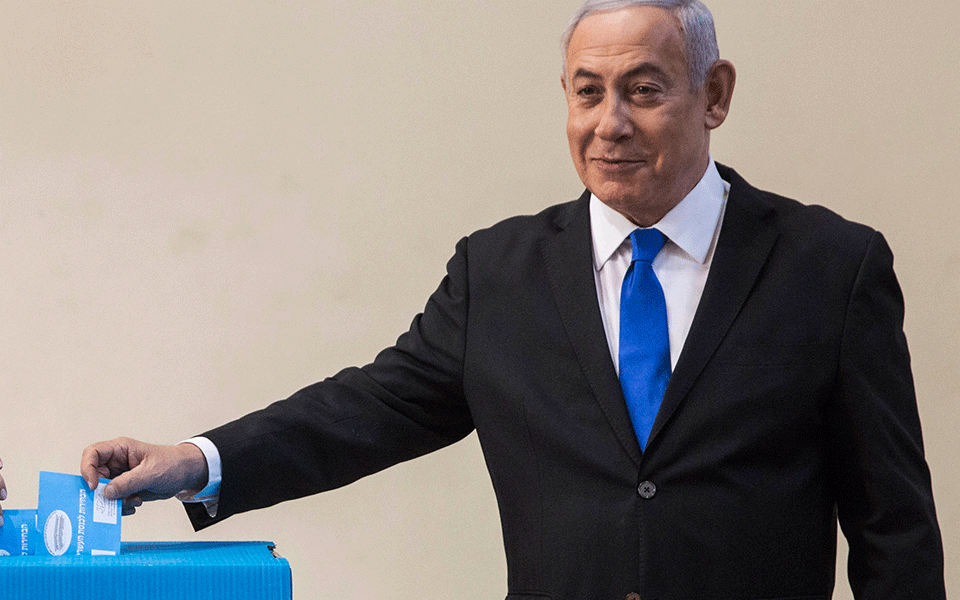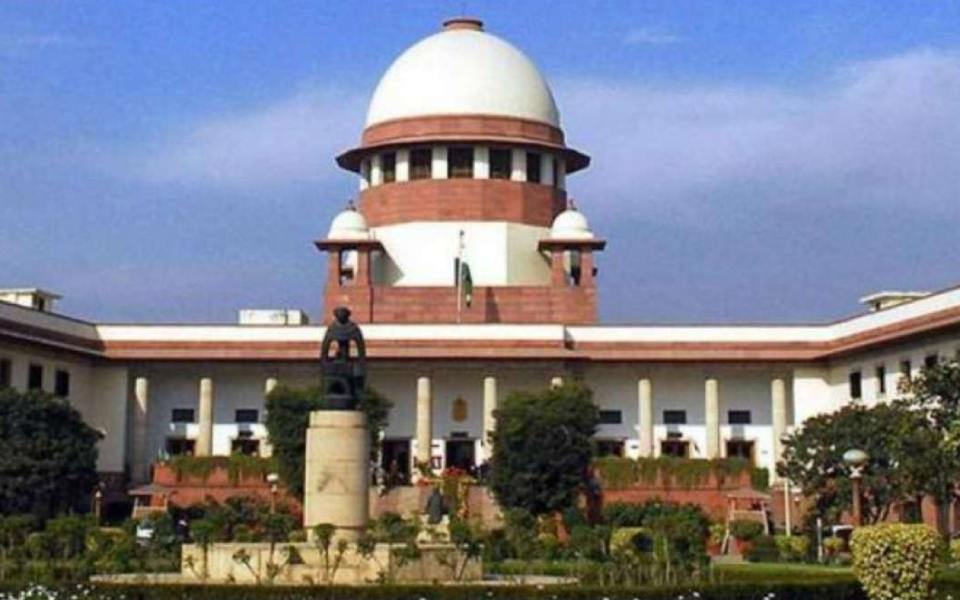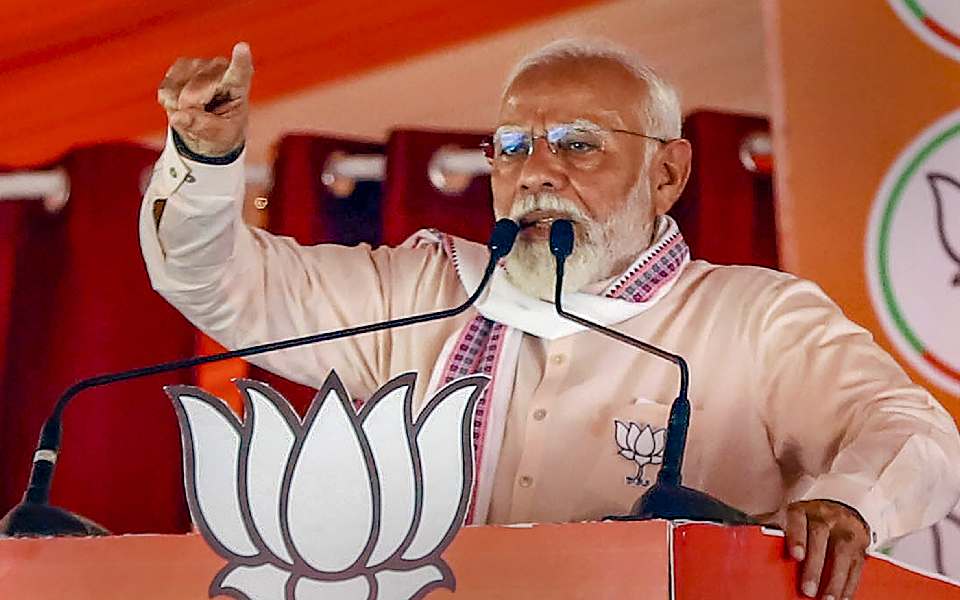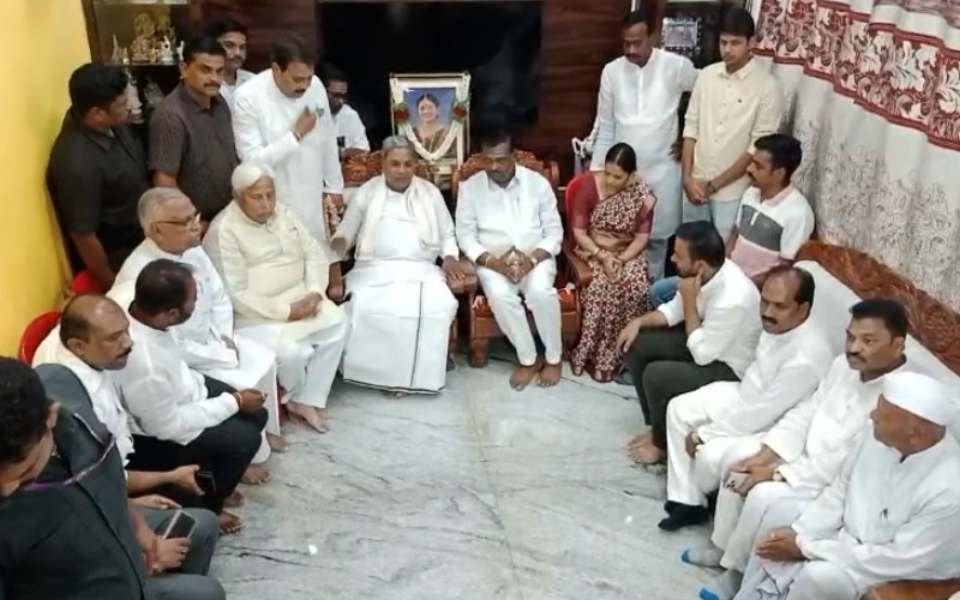Jerusalem: Has the Benjamin Netanyahu era ended in Israel? If the exit polls results are to be believed, the country's longest serving Prime Minister will fall short of securing a parliamentary majority and is set to suffer a setback in his quest for a record fifth term in office.
If the exit polls do not go horribly wrong, then there are no clear winners as well.
The right-wing bloc led by Netanyahu is projected to win between 55-57 seats, but his main challenger Benny Gantz's Blue and White party also does not have the possibility of reaching the magical figure of 61 in a 120-member Knesset (Israeli Parliament), making the possibility of a unity government the most likely one.
The Central Elections Commission said that 69.4 per cent of the eligible voters cast ballots in Israel's unprecedented repeat elections on Tuesday, a slightly larger number than those that took part in April's vote.
Avigdor Lieberman, who has earlier served as Foreign and Defence Minister in Netanyahu led government's, has emerged the kingmaker as per the exit polls. His Yisrael Beteinu party is expected to get between 8 and 10 seats and the ultra-nationalist leader has made it clear that he will back a unity government with or without his party's inclusion.
In an address to his party workers after the polls closed at 10 PM (local time) on Wednesday, Lieberman said that his party would stick to its stand and only support a unity government given that the country faces "an emergency situation both politically and economically".
Yisrael Beteinu had recommended Netanyahu's name to the President for Prime Minister after the April 9 polls, but refused to join a coalition government under him on the question of draft exemption for ultra-orthodox Jews.
The Israeli Prime Minister could not muster a coalition of 61 members without Yisrael Beteinu, leading to an unprecedented repeat polls on Tuesday. Ultra-orthodox Jews backed parties, Shas and United Torah Judaism, were Netanyahu's important coalition partners.
Gantz has also been careful in his post-election address, shying away from declaring victory and has called for unity and national healing.
Netanyahu took to the ruling Likud party stage late on Wednesday, vowing to create a "strong Zionist government" and thwart the formation of a "dangerous anti-Zionist" government.
"We will protect this country," he asserted.
He started by saying, "As you see, I am hoarse", drawing cheers from the crowd, "and as you know, it's better to lose your voice than to lose the country".
"I said the election was hard. That's not the word ....We faced a campaign that was so tilted against us by the biased media, so against us," he said.
"We're still waiting for the results. But one thing is clear, the State of Israel is at a historic turning point. We are facing immense opportunities, and immense challenges... including the existential threat from Iran," Netanyahu emphasised.
He praised the soaring Israeli economy and flourishing diplomatic relations, mentioned US President Donald Trump's expected peace plan and stressed that Israel needs "a strong government, a stable government, a Zionist government, a government that is committed to Israel as the homeland of the Jewish people".
There cannot be a government that relies on the anti-Zionist Arab parties, he said adding, "parties that praise and glorify blood-thirsty terrorists who kill our soldiers, our citizens, our children".
Both Netanyahu and Gantz started reaching out to prospective coalition partners soon after the polls ended.
The big winner of the repeat polls seem to be the Arab population-backed Joint Unity List which is expected to win between 10 and 12 seats with the voter turnout in the Arab sector registering a significant increase from April 9 polls.
A little less than 50 per cent of the eligible Arab voters had participated in the previous elections, but with unity forged between various Arab factions, it soared by almost 13 per cent this time, Election Commission sources said.
With apparent no clear winner and counting moving slowly and significant trends likely to come around Wednesday afternoon, focus has shifted towards President Reuven Rivlin who has vowed to prevent yet another polls by looking at all the possibilities to put a government together.
"President Reuven (Ruvi) Rivlin will meet representatives of the parties elected to the Knesset for a round of consultations after he receives a clear picture of the results, and as soon as possible," his media adviser said in a statement.
"The President will do so in full coordination with the chairman of the Central Elections Committee, and once he has heard the position of all the factions he will take all considerations into account," the statement said.
The president will be guided by the need to form a government in Israel as quickly as possible and to implement the will of the people as expressed in the results of the election, as well as the need to avoid a third general election, it said.
"Accordingly, the President will allocate the role of forming a government after consultation and discussion with representatives of the factions and the leaders of the relevant parties, the statement said.
Meanwhile, Senior Palestinian official Saeb Ereka has said that he hopes the next government "will focus on how to make peace".
Let the Truth be known. If you read VB and like VB, please be a VB Supporter and Help us deliver the Truth to one and all.
New Delhi, Apr 25: A husband has no control over his wife's 'stridhan' (woman's property) and while he may use it during the time of his distress, he has a moral obligation to return it to his wife, the Supreme Court has reiterated while directing a man to pay Rs 25 lakh to a woman in return for her lost gold.
The woman in this case claimed that 89 sovereigns of gold were gifted to her by her family at the time of marriage. Additionally, after the wedding, her father gave a cheque for Rs 2 lakh to her husband.
According to the woman, on the first night of their marriage, the husband took custody of all her jewellery and entrusted the same to his mother under the garb of safekeeping. She alleged that all the jewellery was misappropriated by the husband and his mother to discharge their pre-existing financial liabilities.
The Family Court, in 2011, held that the husband and his mother had indeed misappropriated the appellant's gold jewellery and that she was entitled to recoup the loss caused to her by the said misappropriation.
The Kerala High Court, while partly setting aside the relief granted by the family court, held that the woman had not been able to establish misappropriation of gold jewellery by the husband and his mother.
The woman then moved the Supreme Court against the high court order.
A bench of justices Sanjiv Khanna and Dipankar Datta said 'stridhan' property does not become a joint property of the wife and the husband, and the husband has no title or independent dominion over the property as its owner.
"Properties gifted to a woman before marriage, at the time of marriage or at the time of bidding farewell or thereafter are her stridhan properties. It is her absolute property with all rights to dispose at her own pleasure.
"The husband has no control over her stridhan property. He may use it during the time of his distress but nonetheless he has a moral obligation to restore the same or its value to his wife," the bench said, while referring to an earlier judgment on the issue.
The apex court said matters of matrimony can rarely be said to be simple or straightforward hence, human reaction according to a mechanical timeline before the sacred bond of marriage is severed is not what one would expect.
"Divorce, majorly, in Indian society is still considered a stigma, and any delay in commencement of legal proceedings is quite understandable because of the attempts made to have the disputes and differences resolved; more so, in a case of the present nature, when the appellant was faced with the imminent prospect of termination of her second marriage.
" Even otherwise, the appellant did not present before the Family Court a time barred claim. Doubting the bona fide of the appellant, on facts and in the circumstances, was thus not called for," the bench said.
The top court said the very concept of marriage rests on the inevitable mutual trust of the spouses, which conjugality necessarily involves and to assume that the woman from day one did not trust the husband is rather improbable.
"The High Court, thus, failed to draw the right inference from facts which appear to have been fairly established. That apart, we have neither been shown nor do we know of any binding precedent that for a claim of return of stridhan articles or money equivalent thereof to succeed, the wife has to prove the mode and manner of such acquisition.
"It was not a criminal trial where the chain of circumstances had to be complete and conclusively proved, without any missing link. Undisputedly, the appellant had brought to the matrimonial home sufficient quantum of jewellery, which she wore during the marriage and as is evidenced from photographs," the bench said.
The apex court said the woman had successfully initiated action towards recovery of money in lieu of 89 sovereigns of gold, which in the year 2009 was valued at Rs 8.90 lakh.
"Mere upholding of the decree of the Family Court at this distance of time, without anything more, would bring about injustice to her. Bearing in mind the passage of time, the escalation in cost of living, and in the interest of equity and justice, we deem it fit in exercise of power conferred by Article 142 of the Constitution of India to award to the appellant a sum of Rs 25,00,000," the bench said.





